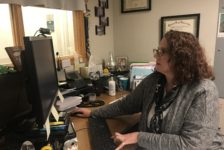
Students can currently help with filling out a climate survey, to provide crucial information to help the college protect against and allocate resources for sexual assault. Students can participate in the survey by visiting myasw.org, or reading their emails from Jason Schwartz-Johnson. Photo courtesy ASW Communication
It floods the mainstream media through hashtags, videos and news articles: the pristine, good ole boy Super Bowl quarterback or SONY and its choking clasp upon Kesha.
Yet, it was being discussed in a closer setting, students packed in room B-18 in the basement of Converse Hall, convening to address sexual assault and engage in a forum with Westminster’s Title IX Coordinator and EO Compliance Officer, Jason Schwartz-Johnson.
The room was filled with voices and dialogue that regarded the good of the entire campus and climate of campus.
Westminster’s Tipping Point, a student club devoted to raising awareness and promoting advocacy against human trafficking and sexual assault throughout a motivated and sustainable network, put on the event with Schwartz-Johnson.
Whitney Walton, senior international development custom major and club co-founder, said Schwartz-Johnson approached her about holding the forum with The Tipping Point and other student clubs.
The agenda was set to talk about the improvements and revisions the college had made since the Office for Civil Rights (OCR) visit in November and also to hear student voices surrounding Title IX and sexual assault campus climate.
Schwartz-Johnson opened stating the major changes that the OCR visit had prompted. The position of the Title IX coordinator would now directly report to the president of the college.
Schwartz-Johnson said the reason for that reporting switch is “independence and accountability.”
The second major change is “investigators [of Title IX cases] are fact finders, and then as Title IX coordinator, I look at the evidence and determine whether there’s a policy violation in place as well as sanctions,” Schwartz-Johnson said. “That way there is consistency.”
This second change was to eliminate bias in the process. Schwartz-Johnson said instead of having investigators determine violations, they were solely in charge of fact finding.
The third change is eliminating the deputy coordinator positions and instead having an advisory board with heavy student involvement focused on residence life and diversity and inclusion.
Beyond the recapping, the OCR visit and the question of where the college was with victim advocate programs loomed. A victim advocate is a professional who is trained in helping sexual assault survivors go through a process of legal investigations.
The advocate provides emotional support, information and acts as a safety-line for finding resources and filling out paperwork.
“Just so you understand what we have here on-campus right now, we have the Counseling Center who can provide confidential information,” Schwartz-Johnson said. “We have the Rape Recovery Center, which is a couple blocks away, that is specially trained in trauma issues and can orient a person about what their options are. During investigations, people are allowed to have their own advisers. We train advisers—professors or staff members—who will accompany people to an investigation and be a support person.”
Schwartz-Johnson paused, said he had questions for the room and asked: “So, how do you see a victim advocate being different than that? And secondly, what’s the demand?”
Emma Gillett, Tipping Point co-founder and senior, was first to answer Schwartz-Johnson’s question to the room. She expressed concerns of numbers and having a resource at Westminster.
“I don’t know numbers because [sexual assault, rape] is so underreported,” Gillett said. “But The Rape Recovery Center, they’re awesome but they cannot support all the people to the capacity that is needed through this really hard thing, though. They’re [The Rape Recovery Center] not just helping Westminster, they’re helping the U, they’re helping the whole community. They’re an awesome resource, but they can’t help everyone. It’s not possible.”
Gillett’s next point was that sexual assault survivors at Westminster should have a place to go at Westminster, where they are comfortable and can receive the same information.
“We need people here that students know are always here when necessary and they can go to because it is already so, so difficult to speak about the situation,” Gillett said.
Students went around the room and built off of Gillett. Some brought up problems with scheduling appointments at the Counseling Center.
The room deliberated and bounced ideas back-and-forth. Students mentioned leveraging the psychology department, training students professionally and creating a potential peer support victim advocate program.
Schwartz-Johnson, Title IX coordinator, said he would look further into the suggestion of a professional victim advocate, training programs and creating a peer advocacy network for the campus.
The Utah Coalition Against Sexual Assault provides 40-hour trainings for victim advocates. Schwartz-Johnson said he would contact them to try and make headway.
Other main topics that surfaced in the forum were potential campus Title IX appreciation events, April sexual assault awareness month and pronoun policies on all campus syllabi.
Students sat and stood in the basement of Converse for almost two hours, passionately discussing ideas and policies.
“I am extremely ecstatic about how many people joined in on the conversation,” said Walton, Tipping Point co-founder. “I had no idea how many people to expect. For people to see the demand, the passion and the ideas from so many student voices on campus from so many intersecting groups—that was really encouraging to me. To see the potential and know that there is so much progress we can make as a community.”
Tiffany Perry, junior psychology major and vice president of Tipping Point echoed Walton’s excitement for filling the room.
“I think it is so great that not only so many people showed up but they were in the conversation and they said, ‘This is what we want, and this is what we won’t accept. That these are our standards and that the bar needs to be raised,’” Perry said. “‘And anything less is not okay.’”









